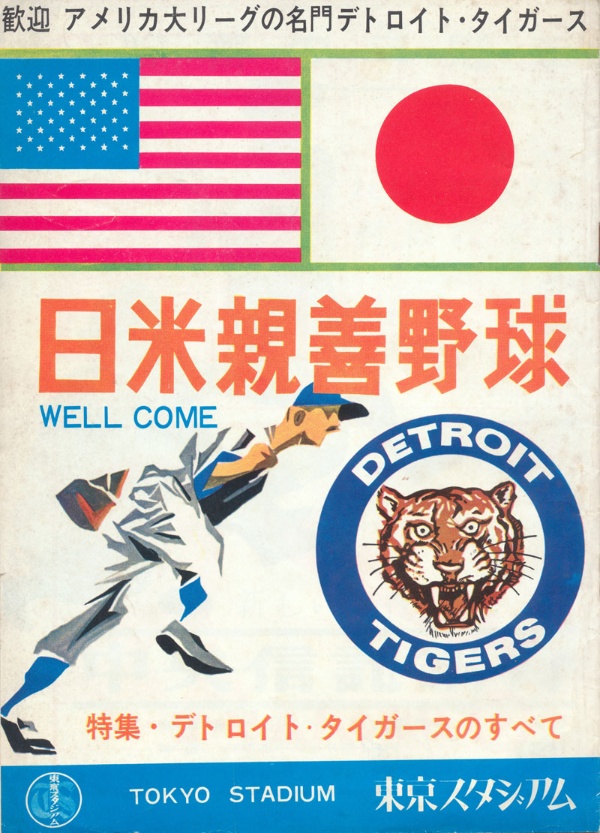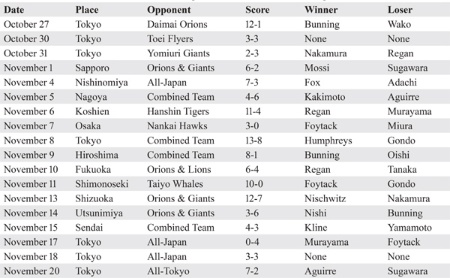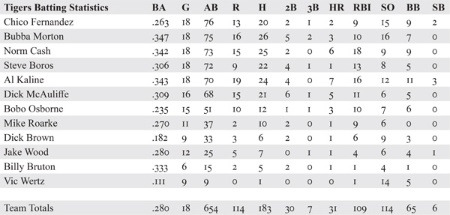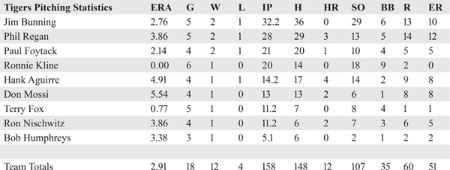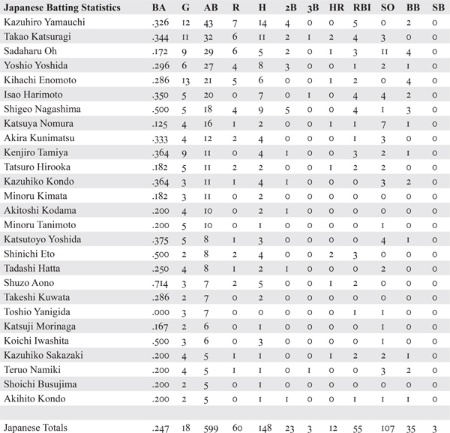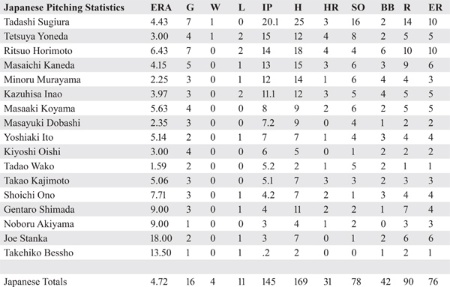No Alibis: The Detroit Tigers’ 1962 Tour of Japan
This article was written by Andrew Forbes
This article was published in Nichibei Yakyu: US Tours of Japan, 1960-2019
1962 Detroit Tigers Goodwill Tour program (Robert Fitts Collection)
For the Detroit Tigers 1962 was a year to forget. They finished the season in fourth place, 10½ games behind the pennant-winning Yankees, with 16 fewer wins than the second-place 1961 Detroit club. The best the Tigers could muster in 1962 was second spot in the United Press International baseball experts’ poll of the season’s “No. 1 disappointment,” a single vote behind Roger Maris, who followed up his historic Babe-besting homer total with “only” 33 in 1962.1
As the Yankees and Giants were renewing hostilities in a rain-soaked World Series, the tired and disappointed Tigers limped off to Asia for a monthlong goodwill tour. As foul weather blanketed the Pacific, a coterie of Tigers trainers, wives, the traveling secretary, and team owner and President John E. Fetzer accompanied a scaled-back squad (just three outfielders and a nine-man pitching staff), first to Hawaii, where they squeezed in two games, and then on to Japan. The schedule called for excursions to Seoul and Okinawa before 17 matches against the best competition Japan could offer.2 Commissioner Ford C. Frick had planned to join the traveling party in Honolulu, but was held up stateside while inclement weather and stingy pitching stretched the World Series out to seven games over two weeks.3
The Tigers touched down in Tokyo on October 18 and participated in a press conference before heading off to the Imperial Hotel.4 On October 20 the players, executives, and wives were the guests of Japanese Foreign Minister Masayoshi Ohira at a cocktail party thrown in their honor. The Americans were formally introduced by Yetsuo Higa, the Hawaiian businessman who, along with the Mainichi newspaper corporation, was instrumental in planning the tour. Tigers President Fetzer gifted Ohira a set of silver cufflinks fittingly adorned with the heads of tigers.5
Commissioner Frick, having finally joined the group in Tokyo, revealed to the press the secondary – or perhaps even primary – reason for his presence, telling the Associated Press that he would meet with Japanese baseball officials to codify regulations surrounding the movement of players between the United States and Japan. “Before I leave we hope to agree on a definite set of rules under which American players can come to Japan,” Frick said, perhaps unintentionally signaling his belief that no Japanese player would ever be skilled enough to play pro ball in America.6
After successful tune-ups in Okinawa (where they “whipped a servicemen’s team,” 9-0, largely on the strength of Jim Bunning’s five no-hit innings7) and Seoul (beating up on an all-star team, 8-0, thanks to a three-run shot by Bubba Morton8), the Tigers returned to Tokyo and prepared to begin competition against Japanese squads.
But the Detroiters would not be at full strength. Much of the Tigers’ trouble during the regular season could be chalked up to injuries, with starter Frank Lary (sore arm), outfielders Al Kaline (broken collarbone) and Billy Bruton (sore leg; broken jaw), and first baseman Norm Cash (broken finger) all missing significant time. By the time the team landed in Japan, Bruton was still unable to play, and Kaline was touch-and-go due to torn ligaments in his foot suffered during one of the games at Honolulu. The injury “definitely has slowed me up,” said Kaline. “It’s a real tough problem. But I’ll play with it taped up and do the best I can.”9 Given the injuries, and the fact that only three regular outfielders made the trans-Pacific journey (with Rocky Colavito remaining stateside to be by his wife’s side as she battled illness), manager Bob Scheffing would be doing a lot of juggling.10
On the eve of the slate’s first game, the Tigers made their first public appearance, taking in a night of entertainment at the Nichigeki Theater in downtown Tokyo. The players and their wives enjoyed a two-hour show by the Nichigeki’s dancers before the boys donned happi coats and took the stage. Scheffing introduced his players to the crowd, and each was presented with a bouquet of flowers. The appearance concluded with the athletes tossing rubber balls into the crowd; those who caught select balls adorned with a Tigers logo would be admitted to the next day’s game free of charge.11
The next afternoon Jim Bunning took the Tokyo Stadium mound for the Tigers in front of 27,000 spectators, including Crown Prince Akihito and Princess Michiko. After the ceremonial first pitch was handled by Japanese Foreign Minister Ohira to US Ambassador Edwin O. Reischauer,12 the Tigers wasted no time providing their starter some run support. Detroit’s hitters roughed up Daimai Orions starter Tomoo Wako, who did not make it out of the first. The Tigers put up eight runs in the opening frame, including a three-run homer by Jake Wood, to cruise to a 12-1 victory. Bunning contributed 5⅓ perfect innings before giving up four hits and giving way to reliever Terry Fox.13
Neither the Tigers nor the Orions came away unscathed, however. In the sixth inning, Detroit first baseman Norm Cash was struck behind the ear by Daimai lefty Shoichi Ono’s errant pitch, necessitating a hospital visit for X-rays, which showed no lasting damage. “I hope to play tomorrow,” said Cash. And Kaline reaggravated his foot injury in the first inning, toughing it out until the sixth when he was replaced by Bobo Osborne.14 Meanwhile, in the other clubhouse, Orions manager Mitsuo Uno was relieved of his duties by club President Masaichi Nagata.15 In his two years as manager, Uno had led Daimai to a 132-136-4 record and a pair of fourth-place finishes, so his employers may simply have seen the lopsided loss as the final straw.
Scheduled games on Sunday against the Yomiuri Giants16 and Monday versus a combined team containing members of the Orions, the Kokutetsu Swallows, and the Taiyo Whales17 were washed out by rain, but the layoff allowed Frick and his officers to hammer out an agreement with their Japanese counterparts. Meeting at the Imperial Hotel, Frick, Tigers owner Fetzer, and AL President Joe Cronin sat down with Japanese Commissioner Yushi Uchimura, Pacific League President Fujio Nakazawa, and Central League President Ryuji Suzuki to formalize a deal that would “prohibit direct trades between Japanese clubs and American players, and vice versa by American major league clubs and Japanese players, without the commissioners’ approval.”18 In Frick’s view, the pact promised “smooth relations” across the Pacific, though it would take only two years for the commissioner to be proved wrong. The 1964 dispute between the San Francisco Giants and Nankai Hawks over the contract status of lefty reliever Masanori Murakami led Frick to write Uchimura decreeing that “all agreements, all understandings and all dealings and negotiations between Japanese and American baseball are cancelled.”19
The Tigers players also kept busy during the rainy days, as pitcher Phil Regan gave a Bible reading at Kawasaki Baptist Church,20 while Bunning, Cash, Scheffing, Kaline, and Dick McAuliffe, along with Hanshin Tigers pitcher (and Central League MVP) Minoru Murayama, appeared on the NHK-TV program My Secret.21
The Tigers – including Cash, recovered from his beaning, and Kaline – returned to the field after the two rainouts to face the recently crowned Japanese champion Toei Flyers at Korakuen Stadium. The Flyers outhit and outpitched Detroit, and played sharper defense. Knotted, 3-3, after nine innings, the game was declared a tie in keeping with an agreement struck at the tour’s commencement that forbade extra-inning games.22 Scheffing, however, complained that he would “prefer to let these exhibition games go into extra innings to settle it one way or another.”23
Things got worse the next day as the Tigers met the Yomiuri Giants in a makeup of their washed-out game, and the Giants “took a liking to the slow curves of right-hander Phil Regan,”24 and held on for a 3-2 win behind starter Minoru Nakamura, who tossed a complete game. “We have no alibis,” said Scheffing, whose squad now had only one win to show for their first three games in Japan. “We weren’t hitting and their pitcher had good control.”25
It was likely with some relief, then, that the Tigers greeted the opportunity to escape Tokyo and begin the road leg of their excursion, alighting first in Sapporo, where they handled a team consisting of Orions and Giants, 6-2, behind the bat of Bubba Morton and the pitching of Don Mossi.26 Thence to Osaka did the Tigers fly, where their game against the Hanshin Tigers at Koshien Stadium was rained out. But the visit did allow John Fetzer to invite their namesake club to their 1963 spring-training camp at Lakeland, Florida, with the American Tigers picking up all expenses accrued in the United States.27
Scheffing’s distaste for tie games might have been a factor in the decision to enter extra innings the next day, a Sunday afternoon at Nishinomiya Stadium. The Tigers and a mixed team of Japanese all-stars were tied, 3-3, after nine, but Detroit exploded for four runs in the 10th, with Flyers rookie hurler Yukio Ozaki the victim.28
Events in Nagoya on November 5, though, might have had the Tigers wishing they’d banked a couple of those runs, as Chunichi Dragons outfielder Shinichi Eto slugged two homers, added a pair of singles, and reached on an error, and the All-Stars (composed of Dragons, Giants, Orions, and Kintetsu Buffaloes) downed Detroit 6-4. Hank Aguirre surrendered five of the All-Stars’ runs, including Eto’s homer on the first pitch of the afternoon. If there was good news for the Americans it was that Billy Bruton’s jaw had healed to the point that he was able to pinch-hit – just in time to strike out to end the game.29
Said Scheffing, “Japanese baseball is a lot better than we were led to believe before we came over here.”30
Blasts by Cash, Kaline, and McAuliffe helped matters on November 6, when improving weather allowed Detroit to play Hanshin in Osaka after the earlier postponement. The American Tigers cruised, 11-4, with Cash contributing four RBIs.31 Chico Fernandez and Mike Roarke chipped in homers to help the Tigers blank the Nankai Hawks 3-0 on November 7.32 It appeared the Tigers were beginning to recall that they had led all of big-league baseball in home runs in 1962 with 209. The pleasing trend continued in Tokyo, as Detroit added four more homers – including another apiece for Cash and Kaline – to best a Swallows/Orions/Whales squad, 13-8, in a contest called in the top of the ninth due to darkness.33 At Hiroshima, homers from Cash, Kaline, and McAuliffe were more than enough to overcome the amassed strength of a Hiroshima Carp/Hankyu Braves/ Hanshin Tigers/Daimai Orions team, 8-1, with Jim Bunning going the distance for Detroit.34
For all their power, the Tigers had not yet hit a grand slam on Japanese soil. Norm Cash fixed that on November 10 at Fukuoka, against a side made up of Orions and Nishitetsu Lions. The clout helped Detroit come from behind to win, 6-4, improving the visitors’ record to 8-2 with a tie.35 The fireworks continued at Shimonoseki against the Taiyo Whales, as Detroit strolled to a 10-0 win that featured homers by Morton, McAuliffe, Cash (his sixth in seven games), and catcher Dick Brown.36
The big hits kept on coming after the Tigers landed in Shizuoka to face a team of Giants and Orions. Kaline notched another homer, and Bobo Osborne’s grand slam in the top of the ninth put the game away for Detroit, 12-7, with the last half-frame called due to darkness. Osborne’s shot was the Tigers’ 27th homer in 13 games on the Japanese tour. The ball left a mark on more than just the scoreboard; spectator Saku Masuda was gifted an autographed ball to go along with a bruise on her shoulder.37
Kaline homered yet again in Utsunomiya against the amalgamated might of the Giants and Orions, but it proved just about all the offense the Tigers could summon in a 6-3 loss, dropping their record to 10-3 with a tie – not shabby, but not the walk in the park they might have expected. Jim Bunning went seven innings but gave up four earned runs in the first and took the loss.38 Kaline homered again – his seventh – the ensuing afternoon at Miyagi Stadium in Sendai, and it was just enough to beat an all-star agglomeration of Flyers, Giants, and Orions, 4-3.39
An offday preceded the final games of the tour in Tokyo, but it apparently did Detroit little good. On an autumn Saturday afternoon at Korakuen Stadium, Hanshin Tigers ace Minoru Murayama, hurling for the All-Stars, turned in what Japanese baseball officials called “the greatest pitching performance by a Japanese since the late Eiji Sawamura lost a [one-run game] to Connie Mack’s All-Stars back in 1934,” a legendary outing that saw Sawamura strike out Charlie Gehringer, Ruth, Lou Gehrig, and Jimmie Foxx in a row.40 Surrendering just two hits, Murayama became the first Japanese pitcher to shut out a visiting American big-league team over a full nine innings. The Tigers’ first hit didn’t come until there were two out in the eighth, when Mike Roarke collected a cheap single to left. “We have no alibis for losing,” said Scheffing. “We just couldn’t hit that fella Murayama.”41 With the loss, the Tigers joined the 1956 Dodgers and the 1960 Giants as the only major-league squads to lose four games in Japan.42
“We gotta be tired,” said Scheffing. “It’s been a tiring trip after a long regular season.”43
The next day brought only moderately better results. Once again facing an All-Japan team, the Tigers registered a 3-3 tie in a game called after 10 innings due to darkness. McAuliffe homered for Detroit; Sadaharu Oh and the Orions’ Takao Katsuragi cleared the fence for the All-Stars. When play ceased, “a band played ‘Auld Lang Syne’ to close the series,” as the game marked the end of the scheduled exhibition itinerary.44 But officials announced one additional game between the Tigers and Japan’s All-Stars, to be played two days later, “a parting gesture of goodwill.” All proceeds of the bonus game were to be “donated to the 1964 Tokyo Olympics fund,” an “unparalleled” move, according to Japan’s Olympic Committee.45
Billy Bruton homered in the finale, and the Tigers rolled to a 7-2 win. For the purposes of the record books, however, the tour was officially over two days earlier, after the tie game, meaning that Detroit’s 11 wins, four losses, and two ties earned them “the worst record ever for a major league club coming to Japan.”46 The Tigers – “the big flops this year in the American League”47 – couldn’t even catch a break at the turnstiles; Detroit’s “total attendance of 383,370 for 17 games in Japan didn’t measure up to the 16-game attendance of the San Francisco Giants’ [441,000] and St. Louis Cardinals’ [430,000] tours in 1960 and 1958 respectively,”48 though in all fairness it should be noted that the Tigers battled soggy weather just about every step of the way.
Before departing, Joe Cronin summed up what the American baseball emissaries had discovered in Japan in 1962. “The Japanese might be able to challenge American major league baseball in the next generation of players,” he told the press. “They are really something to see.49
Having been in Japan for over a month, the Tigers had seen enough. The schedule concluded, they flew home to lick their wounds, rest up, and prepare for the 1963 season.
ANDREW FORBES is the author of two books on baseball: The Utility of Boredom: Baseball Essays (Invisible Publishing, 2016) and The Only Way is the Steady Way: Essays on Baseball, Ichiro, and How We Watch the Game (2021). He is also the author of two collections of short fiction: Lands and Forests (2019) and What You Need (2015). He lives in Peterborough, Ontario, with his wife and their three children.
(Click images to enlarge)
Notes
1. United Press International (hereafter UPI), “The Old Maris – He Ain’t What He Used to Be,” Pacific Stars and Stripes, November 2, 1962: 18.
2. UPI, “Detroit Tigers Receive Warm Japan Welcome,” Bakersfield Californian, October 18, 1962: 50.
3. Red Smith, “Giants Cut Ford Down to Size and Delay Frick’s Far East Trip,” Nashville Banner, October 16, 1962: 17.
4. UPI, “Detroit Tigers Receive Warm Japan Welcome,” 50.
5 Associated Press, “Tigers, Wives Are Honored,” Ironwood (Michigan) Daily Globe, October 20, 1962: 6.
6 Associated Press, “U.S.-Japan Baseball Regulations Sought,” Decatur (Illinois) Daily Review, October 22, 1962: 10.
7. UPI, “Tigers Win, 9-0,” Eau Claire (Wisconsin) Leader-Telegram, October 23, 1962: 10.
8 Associated Press, “Tigers Defeat Korean Team by 8-0 Score,” Ogden (Utah) Standard-Examiner, October 24, 1962: 18.
9 Lee Kavetski, “Tigers Stowaway: The Injury Jinx,” Pacific Stars and Stripes, October 27, 1962: 19.
10. Kavetski, “Tigers Stowaway: The Injury Jinx.”
11 Associated Press, “Team Goes On the Town,” Pacific Stars and Stripes, October 27, 1962: 19.
12. “Dignitaries Are ‘Old Pros,’” Pacific Stars and Stripes, October 28, 1962: 22.
13. Lee Kavetski, “Tigers Score 8 in First to Wallop Orions 12-1,” Pacific Stars and Stripes, October 28, 1962: 18.
14. Kavetski, “Tigers Score 8 in First to Wallop Orions 12-1.”
15. “Orions’ Pilot Fired After Loss,” Pacific Stars and Stripes, October 28, 1962: 21.
16. “Tigers, Giants Washed Out,” Pacific Stars and Stripes, October 29, 1962: 12.
17. “Rain Shakes Up Tiger Slate,” Pacific Stars and Stripes, October 30, 1962: 19.
18. UPI, “U.S., Japan Agree on Player Trades,” Pacific Stars and Stripes, October 29, 1962: 12.
19. Robert K. Fitts, Mashi: The Unfulfilled Baseball Dreams of Masanori Murakami, the First Japanese Major Leaguer (Lincoln: University of Nebraska Press, 2014), 125-6.
20. UPI, “Tiger Hurler in the Pulpit,” Pacific Stars and Stripes, October 29, 1962: 12.
21. UPI, “Papa-San Bunning a Hit,” Pacific Stars and Stripes, October 30, 1962: 18.
22. Lee Kavetski, “Those Tigers Held to 3-3 Tie by Flyers,” Pacific Stars and Stripes, October 31, 1962: 19.
23. A Knot in Tigers’ Tail,” Pacific Stars and Stripes, October 31, 1962: 19.
24. UPI, “Tigers Stopped 3-2 In Japan,” Holland (Michigan) Evening Sentinel, October 31, 1962: 17.
25 Associated Press, “Tigers Lose to Japanese in Exhibition,” Victoria (Texas) Advocate, November 1, 1962: 11.
26. “Detroit Dumps Japan Stars 6-2,” Pacific Stars and Stripes, November 3, 1962: 19.
27. UPI, “Tigers Invite Hanshin Team to ’63 Camp,” Ogden (Utah) Standard-Examiner, November 3, 1962: 4.
28 Associated Press, “Homers Help Tigers Win,” Capital Times (Madison, Wisconsin), November 5, 1962: 24.
29. “All-Stars Shell Aguirre for 6-4 Win; Eto Blasts 2,” Pacific Stars and Stripes, November 7, 1962: 19.
30. “Growing Respect for Japanese,” Pacific Stars and Stripes, November 7, 1962: 19.
31. UPI, “Tigers Clobber Hanshin, 11-4, on Three Homers,” Ogden (Utah) Standard-Examiner, November 6, 1962: 11.
32 Associated Press, “Homers Produce 3-0 Victory for Tigers in Japan,” Escanaba (Michigan) Daily Press, November 7, 1962: 14.
33 Associated Press, “Detroit Tigers Smash Tokyo All-Stars, 13-8,” Hays (Kansas) Daily News, November 8, 1962: 8.
34. UPI, “Tigers Whip Japanese 8-1 for Seventh Win,” Holland (Michigan) Evening Sentinel, November 9, 1962: 11.
35 Associated Press, “Cash’s Slam Propels Tigers, 6-4,” Lima (Ohio) Citizen, November 10, 1962: 10.
36 Associated Press, “Tigers Whip Japan Team,” Capital Times (Madison, Wisconsin), November 12, 1962: 17.
37. “Tigers Blast Stars 12-7,” Pacific Stars and Stripes, November 15, 1962: 19.
38. “All-Stars Beat Bunning, Tigers,” Pacific Stars and Stripes, November 16, 1962: 19.
39. “Tigers Rally, Win 4-3,” Pacific Stars and Stripes, November 17, 1962: 19.
40. Lee Kavetski, “Murayama Holds Those Tigers 4-0,” Pacific Stars and Stripes, November 19, 1962: 19.
41. Kavetski, “Murayama Holds Those Tigers 4-0,” 22.
42. Kavetski, “Murayama Holds Those Tigers 4-0,” 19.
43. Kavetski, “Murayama Holds Those Tigers 4-0,” 22.
44. Lee Kavetski, “Tigers Strengthen Ties with Japan Tour,” Pacific Stars and Stripes, November 20, 1962: 11.
45. Kavetski, “Tigers Strengthen Ties with Japan Tour.”
46. UPI, “Gopher Balls Beat Tigers,” Traverse City (Michigan) Record-Eagle, November 19, 1962: 20.
47. UPI, “Gopher Balls Beat Tigers.”
48. Lee Kavetski, “Tigers Strengthen Ties with Japan Tour,” 12.
49. “Cronin Lauds Japanese,” Pacific Stars and Stripes, November 22, 1962: 19.
50. Listed Japanese players have a minimum of 5 at-bats, 3 innings pitched, or a decision. Yoshikazu Matsubayashi, Baseball Game History: Japan vs, U.S.A. (Tokyo: Baseball Magazine, 2004), 95; Nippon Professional Baseball Records, https://www.2689web.com/nb.html.


